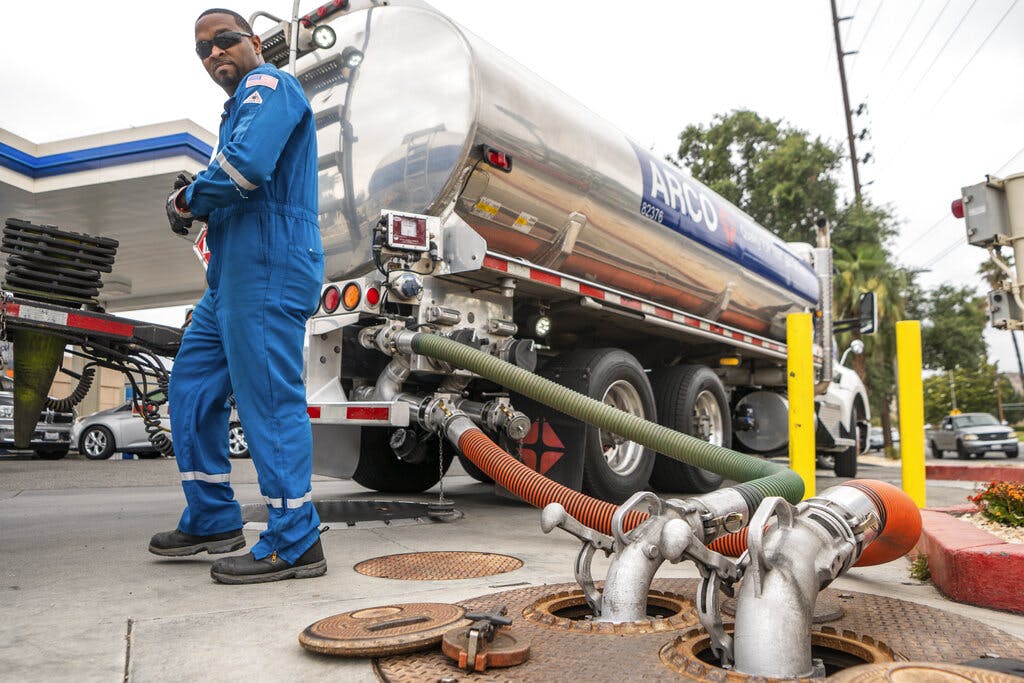California’s Governor Newsom, After Failing To Impose Windfall Profits Tax on Oil Companies, Tries a New Tack
The bill would establish a five-member commission to examine the practices, prices, and profits of oil and gas companies and potentially fine them for ‘market power abuses.’

After failing to get the necessary votes to impose a windfall profits tax on oil and gas companies in California earlier this year, Governor Newsom is pushing for the state to become the first in the nation to create a commission with the power to delve into all aspects of these companies’ businesses.
Last week, the California state senate passed a bill that would establish a five-member commission to examine the practices, prices, and profits of oil and gas companies and potentially fine them for “market power abuses.” The details of potential penalties have not yet been released, as the bill simply calls for the California Energy Commission to develop its own guidelines through the bureaucratic rule-making process.
“For decades, oil companies have gotten away with ripping off California families while making record profits and hiding their books from public view,” Mr. Newsom said in a statement. “With this proposal, California leaders are ending the era of oil’s outsized influence and holding them accountable.”
The commission would consist of five members nominated and confirmed by the state senate. Under the bill, the commission would have the power to subpoena financial records and testimony from gas companies and levy fines.
According to the U.S. Energy Information Administration, the average gallon of gas in California costs more than $4.80 — nearly 25 percent higher than the national average. Much of that price differential can be traced to regulations and taxes imposed on gas companies that do business in the state, many in the name of combating climate change and moving toward “green” sources of energy.
According to the Hoover Institution, Californians pay nearly double the average state gasoline tax, as well as higher premiums for imported gasoline. Since the 1980s, the number of crude oil refineries in the state has shrunk to 15 from 43, a number that is likely to continue declining as oil and gas refiners reconsider their business operations in light of a new state law banning the sale of gasoline-powered cars beginning in 2035.
California Republicans offered an alternative plan to Mr. Newsom’s. The senate Republican leader, Brian Jones, submitted a bill that would have suspended the state’s gas tax, which can amount to as much as a dollar per gallon. Mr. Jones’s measure was defeated by a 20-vote margin.
“While the governor pushes through his measure, it only seemed logical and fair to debate my alternative solution that will actually lower the price of gas by $1 per gallon,” Mr. Jones said in a statement. “To no surprise, California Senate Democrats do the governor’s bidding by rejecting my measure and passing the inevitable gas tax increase.”
The gas commission bill passed by the senate was born of a compromise struck between Mr. Newsom and Democratic leaders in the legislature. Earlier this year, the governor called for a “penalty” on “maximum gross gasoline refining” profit, meaning that should a gas company’s profits exceed a certain threshold, that money would be taken as a “fee” from the corporation.
California statute requires that any new taxes be passed by two-thirds of the state legislature, while the imposition of “fees” and “penalties” requires a simple majority vote.
Five corporations control 97 percent of the California gas market. Those companies — Exxon, Chevron, Marathon, Valero, and Phillips 66 — posted a combined profit of $129.3 billion last year as the price per gallon in California reached an average of $6.42, which led Mr. Newsom to call for new penalties.
Those same five companies suffered immense losses in 2020 at the peak of the Covid-19 pandemic, when few people were traveling and demand for gas dropped to historic lows. The five gas giants lost a combined $35 billion that year.
In response to the governor’s proposal last year, the president of the Western States Petroleum Association, Catherine Reheis-Boyd, called on Mr. Newsom to reverse his strict regulatory policies to bring down costs rather than go after specific companies.
“What the Governor should do is promote an all of the above energy strategy and end his own policies that reduce oil supply and discourage investment in refining capacity and infrastructure,” she wrote in a statement. “These are the actions that create market uncertainties and higher costs to consumers.”

